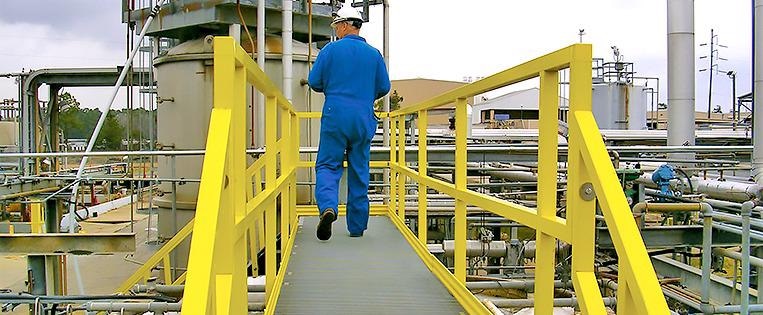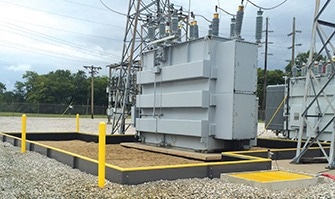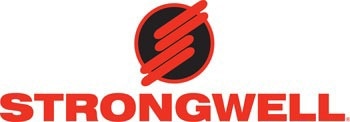Corrosion becomes an inevitable problem when structures come into immediate contact with water and other chemicals, e.g., in water parks and swimming pools. It includes repeatedly accessed places such as pool access ladders, stair towers, and handrails. Corrosion presents a considerable risk of accident to all these safety-critical components.
The material chosen for such demanding applications ultimately governs the mechanical and chemical properties of the final product. Hence, choosing the appropriate corrosion-resistant material is critical for building safe, durable and cost-effective structures.
Importance of Corrosion-Resistant Material
In addition to degrading material, corrosion has a negative impact on the mechanical properties, integrity and lifetime of components, thus leading to a considerable increase in maintenance and repair costs.
The material chosen should meet certain criteria, such as local and enhanced corrosion resistance when subjected to stresses and minimal dissolution in aggressive solutions. For structural applications, the corrosion-resistant material should be strong, lightweight and easy to install.
Longevity and economic consequences in the case of failure are also key factors to consider. The corrosion-resistant material should also have the capacity to withstand high temperatures.

Image Credit: Strongwell Corporation
Key Applications
Corrosion-resistant materials are typically found in automotive components, aerospace, the marine industry, electrical systems applications, structural reinforcements in apartment buildings, bridge decks, parking garages, drainage systems, and recreational water facilities.
Benefits of Using Fiberglass Over Other Materials
Conventional materials used for structural applications include a number of different steel grades based on chromium content. Chromium oxidizes to generate a protective chromium oxide surface layer.
Carbon steel and galvanized steel are the least resistant to corrosion. Steels alloys such as austenitic stainless steels and duplex stainless steels are comparatively much better corrosion-resistant alloys.
Alternative corrosion-resistant materials include copper alloys such as brass and bronze, in which the copper oxidizes to create a protective oxide layer. Metals including titanium and tungsten are vulnerable to galvanic corrosion; they exchange ions and corrode locally.
In comparison, fiberglass is superior to traditional corrosion-resistant materials. Fiberglass is a composite material that uses a polymer resin matrix reinforced by embedded glass fibers. It has unrivaled chemical resistivity, specifically where corrosion is concerned.
The interlaced structure of fiberglass makes it fundamentally impervious to water and other corrosive, alkaline environments.
Fiberglass is exceptionally lightweight (~80% lighter than steel) with a remarkable strength-to-weight ratio and thus improves the component's performance. Fiberglass can be fabricated easily into complex shapes, thus offering greater manufacturing flexibility.
Installing other electrically conductive materials, such as brass, steel, etc., in swimming pools poses a risk of electrical accidents. Thanks to its electrically non-conductive nature, fiberglass means such mishappenings are avoided.
Corrosion-Resistant Material from Strongwell
Strongwell is a global leader in the fabrication of cost-effective corrosion-proof materials. Its portfolio of corrosion-resistant materials includes:
DURASHIELD® and DURASHIELD HC®
Fiberglass pultruded panels predicated on premium polyester or vinyl ester resin, perfect for applications exposed to corrosive conditions. They incorporate a synthetic surface veil that enhances their corrosion resistance.
Standard applications include chemical pit covers, radar and TV antenna enclosures, and wet-end roofs in pulp and paper manufacturing. Durashield HC® is well-suited for environments exposed to high levels of moisture and salt water.
SAFPLATE®
Offers a novel combination of pultruded rigid fiberglass plate and an anti-skid grit surface. It is the optimal corrosion-resistant material for constructing textured solid sheet flooring for pedestrian bridge walkways and trench covers.
STRONGIRT®
This fiberglass-based cladding support system is ideal for continuous insulation applications where the main concerns are corrosion resistance and thermal efficiency.
SAFRAILTM
Economic safety railings for stair rails, guard rails, and walkway handrails in corrosive applications such as those in industrial chemical and wastewater treatment plants. They are produced in square and rounded configurations.
DURAGRATE®, DURADEK® and DURAGRID®
Fiberglass-based gratings for machinery housing and building platforms, especially in safety-critical applications exposed to corrosive environments and oil spillages.
COMPOSOLITE®
Corrosion-resistant, lightweight material for secondary containment systems in electric sub-station transformers and chemical storage areas.

Image Credit: Strongwell Corporation
EXTREN®
Lightweight, pultruded fiberglass structural shapes and plates with exceptional corrosion properties that are well-suited to beam and column structures, handrails, platforms and grating.
Contact the Strongwell team today to find out more about the corrosion-resistant materials on offer.
References
- https://blog.dahlstromrollform.com/corrosion-resistant-metals
- https://www.fastradius.com/resources/top-5-corrosion-resistant-materials/
- https://www.metaltek.com/blog/material-applications-corrosion-resistance/
- https://tantaline.com

This information has been sourced, reviewed and adapted from materials provided by Strongwell Corporation.
For more information on this source, please visit Strongwell Corporation.